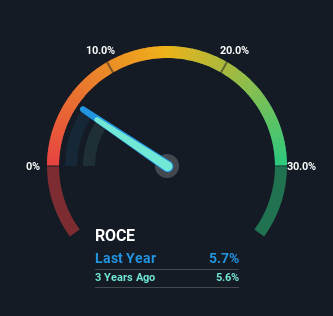- United States
- /
- Other Utilities
- /
- NYSE:BKH
Black Hills (NYSE:BKH) Has More To Do To Multiply In Value Going Forward
What are the early trends we should look for to identify a stock that could multiply in value over the long term? Firstly, we'll want to see a proven return on capital employed (ROCE) that is increasing, and secondly, an expanding base of capital employed. Put simply, these types of businesses are compounding machines, meaning they are continually reinvesting their earnings at ever-higher rates of return. However, after investigating Black Hills (NYSE:BKH), we don't think it's current trends fit the mold of a multi-bagger.
Return On Capital Employed (ROCE): What Is It?
For those that aren't sure what ROCE is, it measures the amount of pre-tax profits a company can generate from the capital employed in its business. Analysts use this formula to calculate it for Black Hills:
Return on Capital Employed = Earnings Before Interest and Tax (EBIT) ÷ (Total Assets - Current Liabilities)
0.057 = US$487m ÷ (US$9.7b - US$1.1b) (Based on the trailing twelve months to March 2024).
Therefore, Black Hills has an ROCE of 5.7%. In absolute terms, that's a low return but it's around the Integrated Utilities industry average of 5.0%.
See our latest analysis for Black Hills

Above you can see how the current ROCE for Black Hills compares to its prior returns on capital, but there's only so much you can tell from the past. If you're interested, you can view the analysts predictions in our free analyst report for Black Hills .
What Can We Tell From Black Hills' ROCE Trend?
The returns on capital haven't changed much for Black Hills in recent years. The company has employed 33% more capital in the last five years, and the returns on that capital have remained stable at 5.7%. This poor ROCE doesn't inspire confidence right now, and with the increase in capital employed, it's evident that the business isn't deploying the funds into high return investments.
In Conclusion...
Long story short, while Black Hills has been reinvesting its capital, the returns that it's generating haven't increased. Since the stock has declined 11% over the last five years, investors may not be too optimistic on this trend improving either. On the whole, we aren't too inspired by the underlying trends and we think there may be better chances of finding a multi-bagger elsewhere.
If you'd like to know more about Black Hills, we've spotted 2 warning signs, and 1 of them makes us a bit uncomfortable.
For those who like to invest in solid companies, check out this free list of companies with solid balance sheets and high returns on equity.
Valuation is complex, but we're here to simplify it.
Discover if Black Hills might be undervalued or overvalued with our detailed analysis, featuring fair value estimates, potential risks, dividends, insider trades, and its financial condition.
Access Free AnalysisHave feedback on this article? Concerned about the content? Get in touch with us directly. Alternatively, email editorial-team (at) simplywallst.com.
This article by Simply Wall St is general in nature. We provide commentary based on historical data and analyst forecasts only using an unbiased methodology and our articles are not intended to be financial advice. It does not constitute a recommendation to buy or sell any stock, and does not take account of your objectives, or your financial situation. We aim to bring you long-term focused analysis driven by fundamental data. Note that our analysis may not factor in the latest price-sensitive company announcements or qualitative material. Simply Wall St has no position in any stocks mentioned.
About NYSE:BKH
Black Hills
Through its subsidiaries, operates as an electric and natural gas utility company in the United States.
Average dividend payer and fair value.
Similar Companies
Market Insights
Community Narratives





